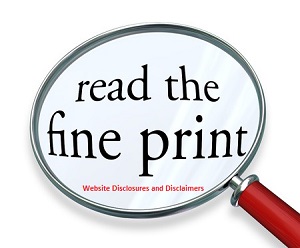 Whether they’re part of your “Privacy Policy” and “Terms of Use,” or a separate legal document, you should include website disclosures and disclaimers to provide transparency to visitors plus reduce your potential legal liability.
Whether they’re part of your “Privacy Policy” and “Terms of Use,” or a separate legal document, you should include website disclosures and disclaimers to provide transparency to visitors plus reduce your potential legal liability.
There is no one-size-fits-all set of website legal documents because the content of each site is different. For example, a website that sells children’s clothing will need different legal language than a site that sells nutritional supplements to retirees. One site may require an affiliate program agreement while another does not.
Related Article: Privacy Policy? What Website Legal Documents Do You Really Need?
However, here are five of the common types of disclosures and disclaimers you’ll see on websites.
1. Material Connection Disclosures.
In essence, a material connection is the connection to a product or service being promoted on a site. Whether you’re the site owner, or an author whose article is posted on someone else’s site, you need to disclose material connections so that consumers can make an informed decision when purchasing the recommended products and services.
Perhaps the most well-known example of a material connection is affiliate status. If you’re promoting as an affiliate in exchange for compensation on sales made, you should disclose that fact. Bloggers frequently fail to do this and it can lead to government investigations and lawsuits.
Related Article: 5 Warning Signs You’re Using The Wrong Website Legal Documents
Another material connection is your relationship to the person selling the product or service. If you’re promoting because of friendship with the vendor, or because you have agreed to cross-promote to each other’s audiences, those can be material connections that a potential client should know about in order to have key facts needed to make an informed purchasing decision.
2. Age Disclaimers.
If your website isn’t for minors, particularly children under the age of 13, you should make that clear on your site. There are additional legal requirements for sites that target children. Don’t assume it’s obvious that your site isn’t for kids. Make it clear with age disclaimers.
Of course, if your website contains adult sexual content, you’re going to need additional disclosures and disclaimers that most sites don’t have.
3. Health Disclaimers.
If you’re selling anything that’s health related – from nutritional supplements to a diet eBook – it’s important to include health disclaimers to limit your potential liability. You want to make it clear that you’re not giving medical advice and that medical issues should be handled by an appropriate medical professional instead of relying upon your website’s content, products, and/or services as a substitute.
4. Earnings Disclaimers.
When your website sells anything related to finances, including make money online (MMO) opportunities, you should reduce your legal risks by using earnings disclaimers that make it clear that you’re not promising website visitors or clients will make a certain amount of money, or any money for that matter.
Note that business opportunity (biz opp) websites typically have additional disclosure requirements.
5. Warranty Disclaimers And Limitations.
To reduce legal risks, you may want to disclaim and/or limit warranties for products and services you sell on your site. For example, you may wish to disclaim that a widget you sell is fit for a particular purpose or limit a warranty period (e.g. a one-year warranty).
It’s important to remember that website disclosures and disclaimers reduce, but do not eliminate legal liability exposure. For example, the Federal Trade Commission (FTC) may ignore such disclosures and disclaimers when determining whether your site violates federal consumer protection laws. However, other government agencies (and courts in lawsuits) may consider such legal language as a positive factor in your favor.
Related Article: Do Your Website Legal Documents Give You Ownership Of Submitted Content?
One thing is certain – it’s better to properly disclose and disclaim than attempt to pull a fast one on the public by failing to do so. This includes making sure your website’s disclosures and disclaimers are easily accessible (no small/hidden links), easy to read (avoid tiny fonts), and provide all the key information a prospective client would want to know before buying a product or service from your site.
Where To Get Website Disclosures And Disclaimers
Your company’s Internet lawyer can prepare a customized set of website disclosures and disclaimers as well as your website’s other legal documents. Be sure to check out our firm’s flat fee Website Legal Protection Package.
